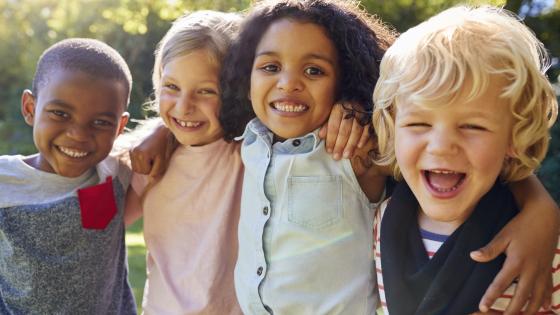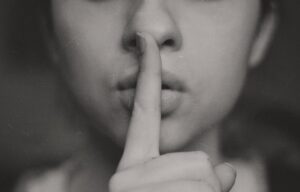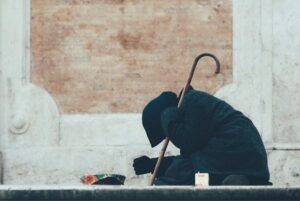Walking the campus of my High School with K-9 units roaming the halls was a harrowing experience for a young teenager. It was the mid-70’s and America was at war. “Race Riots” was our descriptor. Fights broke out daily and police handcuffed more students than I can remember. Fear reigned in the hearts of us all – black and white. Knives and guns were confiscated regularly. Locker shakedowns – it felt like we were in prison.
It was evident in our perplexed faces. Looking over our shoulder, reluctant to go to the Boys Room – unsafe for all colors – with the constant expectation that a fight might break out at any second. That was the reality of our teenage life for months – maybe longer. It felt like a lifetime.
I didn’t fully comprehend it. From the deepest recesses of my heart, it just didn’t make sense. I grew up in a family that showed no outward evidence of racism or prejudice. I saw or experienced no overt bias toward any race. At least as I recall it. I didn’t see color in my relationships. Playing basketball and baseball through high school brought friendships and acquaintances with all races. I had no lens to place a label on anyone. We were just friends.
One of my closest friends was Mickey. African American. We played basketball together on the high school team, visited each other’s home, having dinner with the family. I recall feeling concerned over other people’s reactions to that. Largely because of the prejudice I experienced in them, not in my own internal world. I heard the name-calling, the ignorance, the hatred, but my heart hurt from it. Bad “jokes” and horrendous speak was the prevalent thing – because of the color of someone’s skin. That made no sense to me.
Mom brought me up to love everyone. She came to know Jesus later in life – around the time I was born – at least in a more intimate way. She sat with me every night and we read the Bible and stories of Jesus. It made all the difference in how I saw the children of the world. This song meant so much to me.
Jesus loves the little children
All the children of the world
Red, brown, yellow
Black and white
They are precious in His sight
Jesus loves the little children
Of the world
It underscored the value of parenting from God’s perspective. Teaching me what the Bible taught about life and relationships. About love and service.
Let me clarify something, I wasn’t perfect. Peer pressure is a real thing. The retelling of bad “jokes” and laughing at the racist speak happened too. I’m ashamed of that. But it didn’t reflect my true self. It simply reflected my unwillingness to dissent in the face of racism. I was a teenager trying to form my own worldview and test my identity in the midst of the insanity. No excuses, just reality. (Keep reading for the whole truth)
I could only imagine what my friend was feeling as HE walked the halls of a predominantly white school lined with police, dogs, and the constant tension that comes with a police state. If he looked at someone the wrong way it could erupt in an all-out brawl.
UNTIL I visited him at his home.
It was an all-black community – for many reasons that I don’t have the ability to dissect in this writing. Mickey and his family lived in a townhouse as I recall. A sort of suburban row-home. His brother Tony was a basketball star. He took a likening to me. (I’d love to ask him why now) He was several years older and I looked up to him as a person and a player – as I did Mickey – but with a certain awe and respect – for his talent and his leadership. I didn’t see color. We were just friends. But some of my friends didn’t see it that way. Mickey was called an Uncle Tom, among other things and I was called a honky and n….. lover by my white so-called friends and acquaintances. A horrific characterization that I didn’t know what to do with. It was as if I had to choose one relationship over the other. I didn’t.
Here’s my main point.
When I walked into Mickey’s neighborhood, I felt something. I felt fear and trepidation in light of the current climate and culture we were living in. I felt eyes staring at me from the whole neighborhood. Some with perplexity and curiosity, and some with hatred. We played basketball on an outside court and I was the clear minority. It was an enlightening moment. For the first time, I was able to feel and sense what my friend had been experiencing for a lifetime. Hardly a consolation – but a reality I had never considered. Not understanding is not an excuse for mistreatment. I began to understand, albeit from a very limited perspective. Although I was fearful, I was among a few friends. There was a sense of security in knowing that. They had my back. The family was well respected, and I felt untouchable. Unfortunately, that’s not the reality for most in the world we lived in then or live in now.
We are all little kids in the eyes of God
A concept that is lost on most of us – Child of God. Remembering the innocence of my younger childhood years sits in stark contrast to those of my teenage years. The restlessness and fear I felt in this particular time seemed to last for years in my mind’s eye. I would do all possible to create an alternate reality under that stress and tension. Thankfully, playing sports was my way of doing so. Not so with many kids. If there is such a thing as diversion therapy, we all created our version of it back then.
I’m reading Clarence Thomas’ memoir, My Grandfather’s Son. Ironically, I bought the book before George Floyd’s death in Minneapolis. Before the protests and rioting. Before the upheaval that ensued and is currently capturing all headlines. In it, Supreme Court Justice Thomas gave me a perspective that I hadn’t considered. His plight as a young boy was an experience I’ve heard about and witnessed from the outside looking in but not felt for the African American and minority community until now. Growing up in Savannah, Georgia and being raised by his Grandfather and Step-Grandmother helped form his worldview in a unique way. His Mom unable to care for him and his Father absent left his Grandparents to pick up the mantle and raise him the best they knew how. Hard work. Keep in line. Never quit. Always wanting children of their own but not able to do so, they ventured into parenthood attempting to guide him and his brother into a world that Clarence didn’t fully grasp. Until he did.
Shortly after the death of Dr. King and Bobby Kennedy urban riots and nationwide protests were the norm. In his own words.
“That was a long, hot summer …… and the more I read about the black power movement the more I wanted to be part of it. What was the point of working within the system? Segregation, lynchings, black codes, slavery: the endless litany of injustices raced through my head. Surely the time for politeness and nonviolent protests was over……. Might it be that those rules were nothing more than a sinister invention devised by the white man to fool blacks into cooperation with the oppressive machinery of American life? That summer I tore off the beliefs I had learned from Daddy (his grandfather) and the nuns, the same way Clark Kent tore off his suit. The fog of confusion lifted. I knew what was wrong, who to blame for it, and what to do about it. I was an angry black man.”
Powerful words from a man we now know in a completely different light. With antagonism present between him and his grandfather, Thomas goes on to explain his actions around those feelings after returning to Holy Cross and joining a group of other young angry black men attending a demonstration at Harvard Square in Boston. The demonstration quickly devolved into a riot. This after passing a liquor store where the owner handed out wine to keep from being looted. Drunk and angry do not mix well.
“The police fired rounds of tear gas into the crowd, but that didn’t deter us, and we kept on rioting well into the night.”
After what can only be characterized as an epiphany that likely changed the trajectory of his life this was his perspective.
“I had left myself get swept up by an angry mob for no good reason other than that I, too, was angry. On my way to breakfast, I stopped in front of the chapel and prayed for the first time in nearly two years. I promised Almighty God that if He would purge my heart of anger, I would never hate again. I began to suspect that Daddy had been right all along; the only hope I had of changing the world was to change myself first.”
He went on to summarize the life-changing moment when he realized that, as Ralph Ellison’s Invisible Man brought forth, “how could a black man be truly free if he felt obligated to act in a certain way…………. Now I understood for the first time that we were expected to be full of rage. It was our role – but I didn’t want to play it anymore. I’d already been doing it for too long, and it hadn’t improved my life. I had better things to do than be angry.”
Amen to that. I’m looking forward to understanding more from Clarence Thomas and what it was like to grow up being black in America in the ’60s and beyond – yet overcoming it with persistence and a heart to see things change by contributing as he has for the majority of his life.
White privilege is a real thing. I may not have had a choice to be born into a lower-middle-class white family but I have a choice in how I react in my understanding of the injustices in the world, perhaps even unique to America. The same injustices that have oppressed people of color and other minorities for generations. It’s not pretty. And can’t be ignored.
Forgiveness is Personal
I’ve chosen to do the internal journey necessary to evaluate my own heart in this. Not on social media as so many others have chosen to do. It’s more complicated than tossing out a few “meaningful” quotes or placations and think you have it all figured out.
It’s wrong to assume that reaching out to have a conversation with an African American, born out of some obligation or feeling of guilt, is the answer. I recently heard from an African American man that he didn’t want to have a conversation with a white man about the subject. It felt oppressive in of itself.
Personally, I’m looking for permanent change in my own heart not appeasement of others in an effort to make privilege less of a thing. To somehow in an attempt to level the playing field by words, not deeds. The idea of apologizing for a choice I never made of being born white seems disingenuous. The long-term resolution doesn’t come by sorrowful, momentary placation without doing the hard work. It comes from the places of deep healing needed in my own heart. Forgiveness is personal. If I’ve harmed you personally I need to repent and ask for forgiveness.
“If another believer sins against you, go privately and point out the offense. If the other person listens and confesses it, you have won that person back.” (Matt 18:15 NLT) “Bear with each other and forgive one another if any of you has a grievance against someone. Forgive as the Lord forgave you.” (Col 3:13 NIV)
I’m looking forward to reading a book that Shelby Steele wrote entitled White Guilt, How Blacks and Whites Together Destroyed the Promise of The Civil Rights Era. More on that later but take a look at his thesis.
As the civil rights victories of the 1960s dealt a blow to racial discrimination, American institutions started acknowledging their injustices, and white Americans — who held the power in those institutions — began to lose their moral authority. Since then, our governments and universities, eager to reclaim legitimacy and avoid charges of racism, have made a show of taking responsibility for the problems of black Americans. In doing so, Steele asserts, they have only further exploited blacks, viewing them always as victims, never as equals. This phenomenon, which he calls white guilt, is a way for whites to keep up appearances, to feel righteous, and to acquire an easy moral authority — all without addressing the real underlying problems of African Americans. Steele argues that calls for diversity and programs of affirmative action serve only to stigmatize minorities, portraying them not as capable individuals but as people defined by their membership in a group for which exceptions must be made.
Here’s the Truth
There’s not a person on the planet that hasn’t harbored prejudice or racism or judgment of another human being in their heart. Since Cain killed Abel. Since Ishmael was born from Abram and Haggar, while Sarai bore Isaac yielding a split world order ever since. Aided by their mother Rebekah, Esau yielded to Jacobs demands and gave up his birthright. We all were born into a world at war. One that originated when we decided we knew better than God how to run our own lives. We’ve been fighting to regain prominence ever since.
When I was coming up through the ranks of business in the ’80s and 90’s it was a dog eat dog world. Outwardly you’d step on the guy ahead of you to leapfrog to the next promotion. That’s still the case but more subtly. You need to be politically correct in doing it now, but nothing has changed. Manipulating the system and the people in it is the norm. That same system has been in play with the oppression of minorities and all people of color taking place since the beginning of time, quite frankly. The Arab disdain for Israel. China for America and visa versa. We go along to get along mostly for the money. Russian aggression over the US before, during, and after the Cold War. Nazi’s over Jews. Add your own observations.
I don’t want to oversimplify the solution to the problem but I’m going to do it anyway. The answer to all of this is simple yet complex in its execution. Especially for those blinded by the enemy. When in doubt I always turn to God’s Word for the answers. God spoke these words to Solomon.
“If my people, who are called by my name, will humble themselves and pray and seek my face and turn from their wicked ways, then I will hear from heaven, and I will forgive their sin and will heal their land.” 2 Chronicles 7:14.
Preceding that in verse 13 God said this. “When I shut up the heavens so that there is no rain, or command the locust to devour the land or send pestilence among my people”. A warning of what may be necessary to get our attention.
Pestilence has been unleashed in the form of COVID-19 and I can easily characterize racism as pestilence. In case you were sleeping during this pandemic or the subsequent blow up in the US and around the world over the senseless killing of Mr. Floyd – you may also not be aware of locusts that have been swarming through vast areas of Africa, the Middle East, and Asia. Some swarms the size of Paris endangering the livelihoods and food security of 25 million people. The fear is in the anticipation of a second wave – hundreds of times worse than this. This is a huge problem. We’ve heard nothing about this in favor of the politics and positioning of the media and so-called leaders around this country as they vie for control of the messaging around the current crisis.
It Makes You Wonder Where We Are in God’s Story
We have a God that is so much bigger than the problem we’re faced with. The desires of our hearts are being hijacked by the fear of the current world order. That was never meant to be.
God has a story that includes each one of us in a world gone mad. As friends of Jesus, we have every tool available to beat this plague of racism, prejudice, and judgment toward our fellow human beings. It’s called love. The love that was shown by God’s Son in giving His very life for all of mankind. To be the substitute for our sin. To be the loving role model for each of our lives. He called us to set aside all prejudice and love Him and love others in the way we love ourselves. Forgive, reconcile, restore the broken parts of our lives that were formed through wounds and trauma and influence of others that are at least as broken as we are.
By laying it down, we get to pick up His mantle for those hurting in a world full of hatred. How does that happen?
One life at a time. One moment of caring for a person that looks different than you do – or comes from a different socio-economic setting than you do. It goes both ways.
It starts with a heart change. It always starts with a heart change. Hatred and love can’t exist in the same continuum. It’s impossible.
So what’s the answer for you?
That’s an individual question. The answer lies in each of us. Our heart. Our experiences, past and present inform much of how we view this current situation. For some it’s a crisis, for others it’s an awakening, for many it’s an opportunity to ask the hard questions. What do I believe about myself and my God? Am I truly equal with my brothers and sisters in this world – yet not the same? How and why?
Wrestling with these and many more questions is the only way to resolve it. For believers in Jesus Christ, we need His heart to see, His heart to love. A long term, eternal, kingdom perspective. Through the eyes of our Maker. That’s a tall challenge since we carry constant bias. It’s unavoidable. This side of heaven we will get glimpses of justice but until Jesus returns there will be no absolute justice in a world at war with itself and an invisible enemy called Satan.
Here’s the thing. God’s got this. He’s in control in the middle of the chaos. None of this is a surprise to Him. This may be the all-time greatest opportunity to show the world what love really looks like. From a heart uncompromised toward Christ. For unbelievers, it’s our responsibility as believers in Jesus to model Him and leave the rest to the Holy Spirit to convict others toward eternal life with Him.
Let’s begin with what God has called each of us to do, or be at this time. This could be the birth pangs the Bible speaks of as we look for Jesus’ return. Let’s not waste this moment to reflect, learn, and contribute to a better world, one life at a time.
Blessings to you all as we navigate this and the many other challenges we face in sorting through it all.
Steve






